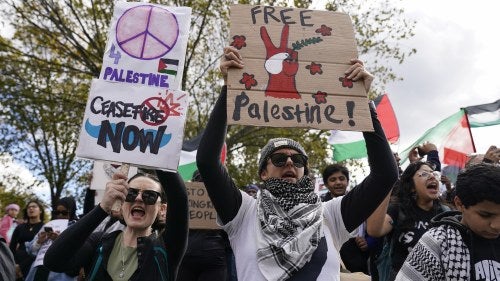Shifting US Opinions and Rising Dissent on Israel-Hamas War

Polling shows younger Americans desire a less active US role in the conflict than their elders.
More than nine months ago, Hamas launched a surprise attack on Israel that resulted in the deaths of approximately 1,200 Israelis and incited the ongoing Israeli offensive in Gaza. The confirmed Gazan fatalities surpass 40,000, but are possibly as high as 180,000. The staggering death toll and reports of Israel’s disregard for civilian safety has sparked growing outrage in the United States over Israel’s military campaign.
American perspectives on the Israel-Hamas conflict reflect growing disapproval over Israel's prolonged military campaign in Gaza and the US government’s handling of the situation. Despite initial support for US military aid to Israel, many Americans now advocate for reduced involvement, emphasizing humanitarian assistance and diplomatic efforts instead. Younger Americans in particular express strong opposition to Israel's actions and favor a ceasefire, while older Americans are more supportive of Israel.
While sympathy for Israel remains high, the desire for a reduction in US military aid to Israel and greater support for a ceasefire and humanitarian aid underscores a significant shift in public sentiment.
American Sympathies Lie More with Israel
Polls show that the public is more sympathetic to Israelis than Palestinians despite growing more critical of Israel's military action in Gaza. However, young Americans diverge significantly in their views toward the conflict, as more side with the Palestinians than Israel.
Though overall sympathy for Israel remains higher than for Palestinians, it has mostly been on the decline since the start of the conflict. A Yahoo! News/YouGov survey fielded just days after Hamas’ attack on October 7 found that 43 percent of Americans sympathized more with Israel, while just 9 percent sympathized more with the Palestinians. A January 25-29, 2024 Yahoo! News/YouGov poll found these numbers at 37 percent and 14 percent, respectively. Another The Economist/YouGov poll fielded June 16-18 reveals a slight drop in these numbers: 33 percent and 16 percent.
Increase in sympathy for Palestinians—and the opposite for Israel—could be attributed to human rights violations by the IDF in the Gaza strip.
Generational Divide: Youth vs. Older Americans
One of the most evident trends from recent polls on the Israeli-Palestinian conflict is that of the stark differences in views between the youngest and oldest Americans.
A Yahoo! News/YouGov survey conducted May 10-13 found that 31 percent of Americans sympathized more with Israel, 19 percent more with the Palestinians, and 28 percent say their sympathies are equally split. However, only 13 percent of Americans youths aged 18-29 sympathized with Israel, while four in 10 sympathized with the Palestinians (38%). In sharp contrast, 49 percent of those over 65 side with Israelis, and only 9 percent with Palestinians.
Another recent The Economist/YouGov poll fielded June 16-18 reveals similar numbers: among those under 30, 13 percent sympathize with Israel and 29 percent with the Palestinians, compared to 54 percent of those over 65 sympathizing with Israel and just 9 percent with the Palestinians.
The generational split, which persists across other aspects of the conflict, is particularly interesting when considering the reasons behind these attitudes. A YouGov poll fielded May 20-22 reveals that older Americans tend to understand the Israeli perspective better than the Palestinian one, whereas younger Americans report a more balanced understanding of both sides. Specifically, 53 percent of those under 30 understand Israeli attitudes toward the conflict, while 56 percent understand Palestinian attitudes. For those over 65, the figures are 78 percent and 45 percent, respectively.
This divergence could help explain the differences in perspectives on the conflict between these age groups.
Younger Americans More Likely to Express Discontent with Israel’s Military Actions
Across several metrics, younger Americans express more wariness than their older counterparts over Israel’s military campaign in Gaza, with a clear preference for Israel to decrease or terminate its operations. Though many believe Israel’s response is justified, popular attitudes also support a ceasefire between Israel and Hamas, particularly among younger Americans.
Although many Americans call for the discontinuation of Israel’s operations in Gaza, more say Israel’s attack is justified (44%) than not justified (33%), according to the YouGov poll from late May. Respondents over 65 are significantly more likely to support Israel, with six in 10 (61%) saying their military attack is justified. The opposite is true for their younger counterparts: as 45 percent of those under 30 say Israel’s actions are not justified, while 30 percent say it is.
Still, that same poll shows half of Americans think Israel should stop its military actions and call for a ceasefire (51%), and this number is nearly six in 10 (58%) among the youth population. Americans over 65 are more split, as 43 percent feel Israel should continue military actions and 44 percent support a ceasefire.
Sentiments across the two age groups remained quite consistent in June, as the Economist/YouGov survey reveals that four in 10 youth Americans say Israel’s actions are too harsh (39%), while only 4 percent say they haven’t been harsh enough. For Americans over 65, these numbers are 25 percent and 28 percent, respectively, again demonstrating more of a split.
Older Americans Insist on Increasing Military Aid to Israel, Unlike Younger Counterparts
In general, polling shows younger Americans desire a less active US role in the conflict as opposed to older Americans.
A CBS News/YouGov poll fielded April 9-12 finds six in 10 Americans under 30 (61%) believe the US should not send weapons and supplies to Israel, compared to just under half of Americans over 65 (48%).
In what appears to be agreement between these two groups, the same poll showed that 60 percent of youths and 61 percent of older Americans feel the US should send humanitarian aid to Gaza. Though, fewer Americans overall since June support sending humanitarian aid to Palestinians. The Economist/YouGov poll finds that 46 percent of those under 30 believe the US should maintain or increase aid, a drop of over 10 percentage points since April—perhaps an indication that younger generations are beginning to prefer a less active role in world affairs overall, even if this pertains to issues like humanitarian aid. In contrast, 56 percent of older Americans support humanitarian aid to Gaza.
Data from the June Economist/YouGov poll further reveals more Americans under 30 want to decrease than increase or maintain military aid to Israel, about four in 10 (43%) compared to two in 10 (23%). For those over 65, the opposite is true: only 24 percent desire a decrease, while 64 percent want an increase or maintenance of US military aid to Israel.
Hope for a US-Led Ceasefire?
In light of shifting opinions and rising dissent among Americans—particularly among younger generations—there is a growing momentum for the United States to advocate for a ceasefire in the Israel-Hamas conflict. With the start of a new academic year, higher institutions across the country may continue to see a new wave of student protests in favor of ending the violence in Gaza.
With changing American perspectives on this conflict also comes a notable generational divide. While sympathy for Israel remains higher overall, those under 30 increasingly sympathize with Palestinians and express strong opposition to Israel's military actions in Gaza, whereas those over 65 side more with Israel and are more likely to support a prolonged military campaign in Gaza.
Still, with half of Americans in general favoring a ceasefire and substantial portions of the population advocating for less aggressive involvement, the time is ripe for the US to lead peace efforts and prioritize a ceasefire.


Related Content
 Public Opinion
Public Opinion
Pluralities also say the United States has given Israel either the right amount or not enough military assistance and support.
 US Foreign Policy
US Foreign Policy
The US public is now equally split on whether Israel’s war against Hamas in Gaza is justified or not.
 Public Opinion
Public Opinion
Whether attacked by its neighbors or Tehran, majorities of Americans oppose using US troops to come to Israel’s defense.
 Public Opinion
Public Opinion
Americans are also slightly more likely to say Israel has gone too far in its war with Hamas than to say Israel’s actions are justified.